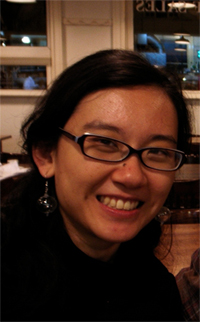Research and Teaching Staff of the School, a Presentation of Dr Wendy Gan
By Janet Jin (Jiayi) and Jane Tian (Shujing)

~
Can you give us some background on how you came to be in Hong Kong? How do you find working in HKU?
I finished my Ph.D. in London and began applying to various universities in Asia. I received two offers, and because it was more intriguing for me to work in Hong Kong than in Singapore, I came. I’ve now been at HKU for fifteen years and the collegiality of the department and the earnestness of most of our English majors continue to be a great joy to me.
Can you tell us about your current research work?
My current research looks at popular but neglected middlebrow fiction dealing with China. My focus is on texts from the early twentieth century.
Since you have served on the DRPC (Departmental Research Postgraduate Committee) for many years, can you give us a brief overview of your duties? How do you find the balance between the administrative work and your academic research?
I have now passed on my DRPC chair duties to Dr. Heim, but a large part of DRPC work is to do with admissions. This is done in concert with a team of colleagues who help vet, short list and interview applicants. Once candidates join us, the DRPC chair helps to orientate the new students, signs their forms, and is a person they can turn to if they are experiencing problems with supervision or other matters.
Being able to balance administrative work and academic research is about discipline. There are times when it is easier to remain in the administrative mode because it less onerous and feels almost more useful than grappling with some obscure text and even more obscure ideas. It is then that you need a certain amount of grit to push your mind to re-embrace difficult thoughts once again in academic research.
As a large part of your research is about British women’s writing, could you tell us what inspired you to focus on this area in particular?
I was interested as an undergraduate in exploring the field of women’s writing. I dabbled in some creative writing myself then and I was curious to see what other women writers had done, to see if there were similarities between a young Singaporean woman’s feelings and thoughts and the long parade of women from the past. Why British? Coming from a former colony (Singapore), with an imagination shaped by British writers, it has always been a British sensibility that called.
Since part of your research interest lies in movies, could you tell us what inspired you to do research on movies? What kind of movies do you prefer watching? Could you recommend some of your favorite movies to our readers?
I have had a long-standing interest in film since my teenage years. I became a member of the Singapore Film Society so that I could get a chance to watch films that would not have otherwise secured a commercial release. These were the days before dedicated art house cinemas emerged, and before VCDs and DVDs made it easy to find obscure foreign films. I was also a huge fan of Wong Kar Wai, and when I came to HK, it just seemed like a perfect opportunity to delve into HK film studies. It was also a way to connect with Hong Kong as an academic.
Every year during the welcome party for new postgraduates, you make delicious brownies. Do you often cook? What kind of food do you prefer? Do you have any recommendations for food in Hong Kong and Singapore?
I do like to cook and bake and I do it often. Baking is a form of therapy and a very delicious one at that. The initial motivation, though, was not being able to find in Hong Kong the kind of baked goods that I really enjoyed. I have family members who were fantastic cooks and bakers so I am particular about my cakes and desserts.
I like all kinds of food. It’s part of my heritage growing up in a multicultural environment—I enjoy Indian, Malay, the different varieties of Chinese cuisine, western, Japanese, Indonesian, Thai …
As for food recommendations, I’d suggest looking out for the humble hole-in-the-wall in Hong Kong or the unpretentious food stall in Singapore. Some of my most satisfying meals have come from such places!
Do you have any advice for current and future postgraduate students?
It is quite normal for you to feel confused, frustrated and, at times, even clueless when you begin your research. Keep calm, keep reading widely, and keep thinking. If you have the intellectual capacity to do this, the ideas and clarity will eventually come.

Our apologies, you must be logged in to post a comment.